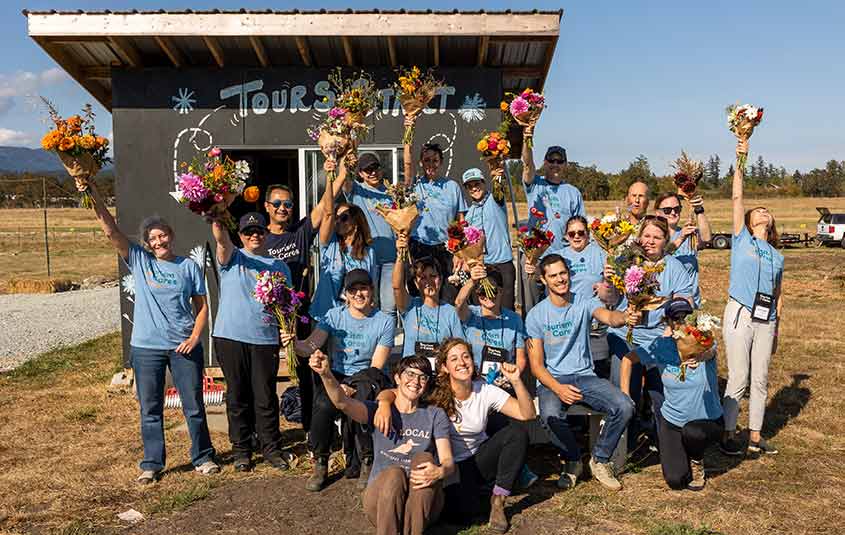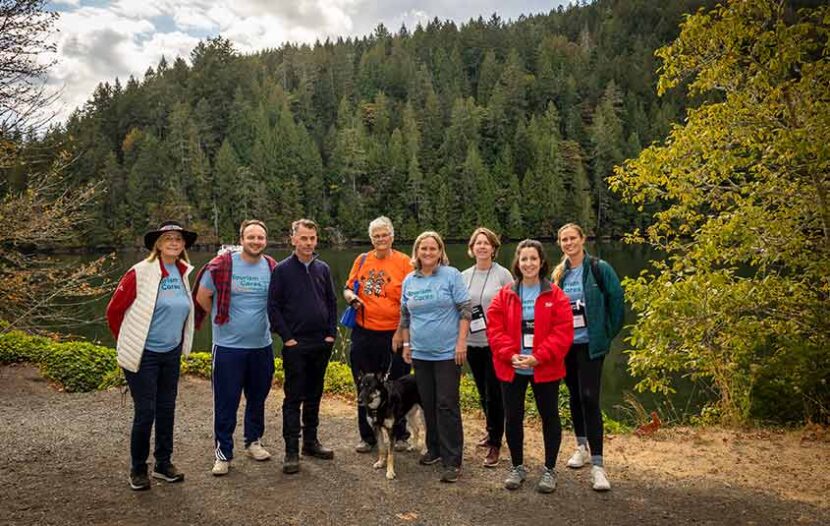TORONTO — For Brett Walker, no trip to the beach would be complete without one thing – a garbage bag.
Used to pick up trash along the shoreline, the bag represents just one small way Walker can help make this world a better – and more sustainable – place. And as General Manager of Collette Vacations, Canada and Chair of CATO (Canadian Association of Tour Operators), his passion for sustainability and the environment has naturally extended into his work life.
This is why he’s so excited about CATO’s new partnership with Tourism Cares, a U.S.-based non-profit organization dedicated to the long-term survival of the travel and tourism industry by way of mutual respect between people and the planet. Though in its very early stages, the new partnership, says Walker, will bring together CATO’s approximate 26 members under a common goal of making a positive impact on the environment and in local communities they visit.
“When I first reached out to Tourism Cares a few months ago, they were already working with very large organizations like USTOA and ASTA, plus several of our own members like Goway and Globus family of brands have also been longstanding members of the organization,” says Walker.

Tourism Cares Meaningful Travel Summit
“Tourism Cares already has a very robust initiative, one that’s been well vetted. It’s got all of the relevant authority and by now, it’s well oiled. Partnering with them gives us a chance to build on that support amongst our members to be a progressive organization and to be a collective, despite the fact that we’re all competitors. But there are certain realms – like animal welfare, gender equity and sustainability – where we all need to work together for the common good,” he adds.
WHAT EXACTLY IS SUSTAINABILITY?
In order to understand CATO’s role as a Tourism Cares partner, one must first understand what sustainability actually means. According to Tourism Cares, the term means “meeting the needs of the present without diminishing the ability of future generations to meet their needs.” It also means that human practices, like travel, do not result in “the permanent damage, alteration or depletion of the environment, ecosystems, species or natural resources.”
On a broader scale, Responsible Tourism refers to “any form of tourism that can be consumed in a more responsible way.” This includes everything from minimizing negative social, economic and environmental impacts, to generating greater economic benefits for local people, to providing access for people living with physical challenges.
But it’s difficult for any organization to summarize sustainability as just one thing, as Emma Cottis tells Travelweek. Cottis, General Manager, Business Systems at Goway Travel, who also sits on the board of USTOA, a founding member of Tourism Cares, says that the term has mistakenly been pegged as strictly an environmental issue by most people. Sustainability, rather, should extend beyond environmental concerns to also include cultural and social responsibility, as discussed during Tourism Cares’ Meaningful Travel Summit in Victoria, BC last month where the topic of First Nations and preserving their cultures took centre stage.
“We really have to start asking ourselves: do they want you back? As a tourist going into a community, are you leaving that community with a positive impact? If having too many people on the ground means eroding their culture, then that’s the wrong kind of tourism,” says Cottis.
Walker adds: “If travel isn’t intuitive, if there’s no value to it socially, culturally, economically or environmentally, then at the end of the day you’re only degrading and not enhancing or rejuvenating. So, it’s important to create a value to it for local communities, and not just environmentally or just economically, but many different ways.”
WHAT IS CATO’S ROLE?
So what are the next steps for CATO now that they’ve aligned with Tourism Cares? What exactly does this new partnership mean for CATO members?
According to Walker, the top priority right now is to facilitate discussion among its members and build awareness about sustainability and responsible tourism. This will largely be done via CATO’s new website, www.cato.ca, which he says was a big part of its new sustainability efforts.
“One of the reasons why we needed a member site is to have a place where we could really engage organically, in real time, on a wide range of issues – not just sustainability, but sustainability is certainly a very big one,” says Walker. “We’re not here to enforce any mandates or policies – we’re not that type of organization. What we’re here to do is try and garner support for these issues and make sure we’re all talking about the same thing, in the same way so as not to confuse consumers.”
A meeting among CATO members is scheduled for later this month to “begin to move the needle” on issues such as sustainability. Since much of CATO’s activity is based on the will of members, forming a sustainability committee in the future is a possibility, says Walker, should members deem it necessary.
Looking far ahead into the future, Walker says he foresees CATO potentially signing the Glasgow Declaration on Climate Action in Tourism, which over 450 organizations around the world have already signed in support of halving emissions over the next decade and reaching net zero emissions by 2050.
On a more local scale, Cottis says that CATO’s partnership with Tourism Cares will hopefully serve as a sign to the Canadian travel industry – specifically travel advisors – to get involved.
“We want travel agents to be aware about these issues, including the decolonization of First Nations and supporting those communities and their tourism products,” she says. “There’s a lot of things we can do – it’s just about finding the resources and being pointed in the right direction. So now travel agents can get some guidance from CATO, which will help connect the dots and lead the charge in Canada.”
CHANGING SHOPPING HABITS
To those who think ‘sustainability’ is simply a buzz word or passing trend, consider this: 71% of global travellers want to make more sustainable travel choices in the next year (up 10% from 2021), 78% intend to stay in a sustainable property at least once in the coming year, and 59% say they want to leave the places they visit better than when they arrived.
These stats from Booking.com’s 2022 Sustainable Travel Report, which gathered insights from over 30,000 travellers in 32 countries, indicate how relevant sustainability has become in today’s travel landscape and the incredible sway it has on current shopping habits. And in response, airlines, cruise lines, hotels and tour operators have taken a firmer stance in recent years on everything from carbon offsetting and plastics consumption, to energy conversion and waste reduction.
Take Collette, for example, says Walker, which a few years ago introduced its first-ever tour using only public transit. Calling it a small step towards the greater good, Walker says he’s seeing an increasing number of creative ways travel and tourism have responded to the sustainable movement, including route maps in places like Barcelona that are designed to disperse pedestrians so that they’re not all walking in the same direction, at the same time, so as not to erode or negatively impact local infrastructure. Walker says he’s also seeing more consumers book back-to-back tours “because they want to minimize their carbon footprint.”
“I don’t think this group of people represents the vast majority just yet, but the fact that we’re seeing more every day is a signal that sustainability has become important to many consumers, particularly the younger ones,” he says.
But how will consumers know which travel companies are practicing sustainability? How would a tour operator, for instance, be held accountable by the travelling public for its actions? According to Cottis, it’s very easy to measure sustainable activities nowadays.
“There are a number of calculators out there that allows you to measure your impact, down to the amount of electricity you’re using,” she says. “I don’t expect someone in 12 months to suddenly be carbon neutral, or for a company to become a B Corp. But just the act of measuring where you’re at, setting targets and being transparent by saying ‘we’ve improved by X percent’ is a move in the right direction.”
IT’S GOING TO TAKE TIME
In an age where just about anything can be accessed, shared or modified with a simple click of a button, Walker cautions that it’s going to take time – a lot of it – to see real change when it comes to sustainability.
“If you look at anything in just a moment in time, you’re going to gauge very, very little. But if you broaden that lens to one year, two years, five years, all of a sudden you have a really good understanding of who’s doing what and what changes are being made,” he says. “It takes a long time to curate and develop technologies, solutions and processes. We’re not going to get rid of planes and cruise ships all of a sudden – nor should we. But we can try to make each and every one of them work towards a positive impact in the future.”
Noting that “incrementalism can make significant gains,” Walker is confident that in five years’ time, “it will be night and day from what CATO is doing now.”
GETTING EVERYONE ONBOARD
When asked whether he’s concerned about any pushback from CATO members about adopting sustainable practices, Walker says they simply can’t afford to not be onboard.
“Can you imagine if we had any pushback about gender equity or animal welfare? You can push back all you want but not for long. As we as an industry make more and more positive changes toward sustainable goals, those who resist will become bottom feeders and will be singled out,” he says.
Cottis suggests that there’s also a business case to be made for tour operators to be more sustainable, saying that it’s not only good for the planet but also for their bottom line.
“Changing your buying patterns can be as something as simple as switching to solar panels,” she says. “Yes, there’s an upfront cost but you’ll see savings down the road on your electricity bills. We all need to change the way we think and operate in a more sustainable way because we simply can’t afford to anymore.”
For more information about Tourism Cares go to https://www.tourismcares.org/.
Got a story idea? Reach out to Deputy Editor Cindy Sosroutomo at cindys@travelweek.ca.

